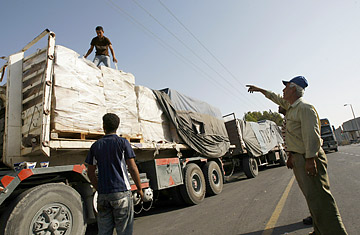
Palestinian workers inspect trucks carrying supplies after they arrived in Rafah town through the Kerem Shalom crossing between Israel and the southern Gaza Strip
Israel has not voted to end its blockade of Gaza — it would deem such a move a victory for the territory's Hamas rulers and also a vindication of the effort to break the siege by the aid flotilla that was raided by the Israeli military, resulting in the deaths of nine activists. Instead, according to a government statement on Thursday, Israel has "agreed to liberalize the system by which civilian goods enter Gaza [and] expand the inflow of materials for civilian projects that are under international supervision." In other words, to ease the blockade.
Although the practical meaning of the decision remains unclear, it involves loosening prohibitions on food, toys, school supplies, kitchen utensils, mattresses and other goods entering the territory. Already last week Israel had begun allowing in potato chips, jam, honey, halva and cookies, stung by the negative publicity over the botched raid on the flotilla. But the fact that such benign items had been on a list of prohibited goods in the first place seemed to negate Israeli claims that the purpose of the blockade was simply to prevent weapons from entering Gaza. In fact, Israeli officials had long made clear that the blockade was a strategy of "economic warfare" against Hamas, aimed at squeezing the civilian population of Gaza to turn it against the Islamist movement that seized complete control of Gaza after a power struggle with Fatah militias in 2007.
The change in the terms of the blockade followed talks with former British Prime Minister Tony Blair, acting as the representative of the Mideast Quartet — the U.S., the European Union, Russia and the U.N. It was speculated that he was seeking a deal under which Israel would ease the terms of the siege in exchange for Western acceptance of Israel's conducting its own inquiry into the flotilla raid, rather than submitting to an international probe as demanded by Turkey and others.
But the move is clearly limited and falls well short of lifting all restrictions on Palestinian economic activity and simply inspecting all cargoes in and out to prevent the transfer of weapons and military matériel. Speaking ahead of the announcement, Maxwell Gaylard, U.N. deputy special and humanitarian coordinator for the Middle East, told reporters that far more was required than merely expanding the list of items allowed into the territory. "What we need to see is an improvement in Gaza's water, sanitation, power grid, educational and health sectors," Gaylard told Inter Press Service. "Gaza's economy is shot to pieces, and its infrastructure is extremely fragile. Something dramatic has to happen soon if Gaza is to be seriously rehabilitated."
It's not clear that Gaza's economy will be rehabilitated under the deal brokered by Blair, which eases the terms of the blockade without addressing its underlying political logic. "The policy in Gaza," Blair said on Tuesday, "should be to isolate the extremists but to help the people." The U.S. and its closest allies remain committed to a boycott of Hamas until such time as the movement is prepared to renounce rather than simply suspend violence and to recognize Israel and accept previous peace agreements it had no part in. But more pragmatic voices — ranging from former Israeli national security adviser Giora Eiland to Blair's former U.N. ambassador Sir Jeremy Greenstock — have urged the West and Israel to begin engaging pragmatically with Hamas, which remains the only organization that can keep the peace in Gaza and without whose involvement any peace agreement negotiated between Israel and the Palestinians is unlikely to take hold.
The crisis in the blockade strategy created by the flotilla debacle runs deeper: the joint strategy adopted four years ago by the West, Israel, the moderate Arab regimes and Fatah to isolate Hamas and force it out of power has not only failed to achieve its objectives but has ceded the initiative to others to set the regional agenda. Turkey played a leading role in the flotilla, reiterating its newfound independence from the U.S. on regional issues — and its willingness to challenge Washington and Israel. In doing so, Turkey is channeling the overwhelming majority of public opinion throughout the region and highlighting the fact that rather than Hamas, it is the Arab governments that have cooperated with the U.S.-Israeli blockade strategy that are increasingly isolated and under pressure to distance themselves from the siege. Easing the blockade may relieve some of the immediate political pressure, but it's a decision that affirms that the U.S.-Israeli-Arab strategy to write Hamas out of the Palestinian political equation is in deep trouble.
